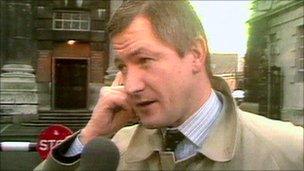Pat Finucane's family anger after PM rules out inquiry
- Published

Pat Finucane was shot dead by loyalists in front of his family in 1989
The family of murdered solicitor Pat Finucane have cut short a meeting with David Cameron after the prime minister failed to order an inquiry into the killing.
Mr Finucane was shot in 1989 by loyalist paramilitaries at his north Belfast home.
His family have long campaigned for an independent public inquiry.
However at Tuesday's meeting, Mr Cameron proposed a review conducted by a leading QC.
Speaking outside Downing Street, Pat Finucane's widow Geraldine told reporters she felt so angry she could hardly speak.
Mr Finucane's family said they were "insulted" at the proposal for a review of the case to be led by QC Desmond DeSilva.
They said they would continue their campaign for an independent public inquiry and would not participate in the review.
When he was prime minister, Tony Blair agreed to set up an inquiry, but a fresh investigation was never established.
Before the meeting on Tuesday, the government said they hoped the Finucane family would be satisfied with their response.
Unacceptable
Speaking afterwards Mrs Finucane said: "He (David Cameron) is offering a review. He wants a QC to read the papers in my husband's case and that is how he expects to reach the truth.
"All of us are very upset and very disappointed."
The family have said they want an inquiry that is public, effective and independent.
Mr Finucane's son Michael said of the review: "The family of Pat Finucane will not be allowed to participate, we will not be allowed to read documents for ourselves, we will not be allowed to ask questions of witnesses, if indeed any witnesses are going to be questioned.
"We will not be allowed to put our point of view across, we will simply not be a part of this process at all.
"How could anybody sign up to something like that - it's a farce."
A statement on behalf of Mr Cameron said: "The prime minister expressed his profound sympathy for the family and said it was clear from (the) Stevens and Corey (inquiries) that state collusion had taken place in Mr Finucane's murder and he accepted these conclusions.
"On behalf of the government he apologised to the family.
"He confirmed that the government's priority was to get to the truth in the best and most effective way and the secretary of state will set out the details for this process shortly."
In 2004, the then Northern Ireland Secretary of State Paul Murphy announced his intention to hold an inquiry under the new Inquiries Act.
'Raising hopes'
The Finucane family are opposed to the probe being held under this legislation, which they say makes the inquiry accountable to the minister responsible, rather than to parliament.
SDLP justice spokesperson Alban Maginness said the decision was "unacceptable" and accused David Cameron of raising the family's hopes.
"After all this length of time one would have expected better from the British government and prime minister on an issue that runs deep into the British military and security complex," he added.
Sinn Fein's Gerry Kelly said the government was guilty of "an extreme act of bad faith".
"It is in the interest of everyone in our society, including all who seek to engender public confidence in the new beginning to policing and justice, that an effective, independent inquiry is held into the killing of Pat Finucane," he said.
The DUP's Nigel Dodds said he understood the desire of relatives to get the full facts about the death of their loved one.
"However, history in Northern Ireland has shown that the kind of expensive open-ended inquiry demanded in some cases has not been able to bring closure for anyone involved and has actually increased community tensions," he said.
Ulster Unionist Mike Nesbitt said while he could understand the Finucane family's frustration, the government was right to end the "costly impasse" which had developed over the inquiry.
He said an agreed mechanism was needed to deal with the past "rather than a series of processes that serve to re-write history, painting the state and the agents of the state as the villains".
Speaking in the Irish parliament, Taoiseach Enda Kenny said if Geraldine Finucane was not happy with the outcome of her meeting with Mr Cameron, then the house would not be happy either.
- Published11 October 2011
- Published11 October 2011
- Published13 May 2011
- Published29 December 2010
- Published11 November 2010